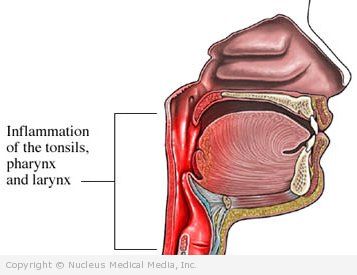(Viral Rhinitis)
Common cold – Definition
The common cold is an infection that can irritate your upper respiratory tract (nose and throat).
Common cold – Causes
The common cold is caused by a virus. There are over 200 different viruses that can cause a cold, including:
- Rhinovirus
- Corona virus
- Adenovirus
- Coxsackie virus
- Paramyxovirus
- Parainfluenza virus
- Respiratory syncytial virus
Common cold – Risk Factors
A risk factor is something that increases your chance of getting a disease or condition.
Risk factors for a cold are:
- Being near someone who has a cold
- Touching your nose, mouth, or eyes with contaminated fingers
- Having allergies (lengthens duration of cold)
- Smoking or being near cigarette smoke (due to decreased resistance)
- Stress (due to decreased resistance)
- Sex: female (especially around menstrual periods)
Common cold – Symptoms
Symptoms include:
- Sore or scratchy throat
- Stuffy nose (hard to breathe through your nose)
- Runny nose
- Sneezing
- Itchy, stuffed sensation in the ears
- Watery eyes
- Slight cough
- Headache
- Aches and pains
- Low energy
- Low-grade fever
Common cold – Diagnosis
The diagnosis is usually based on your symptoms.
Common cold – Treatment
A cold usually lasts more than 10 days. There are no cures for a cold. But there are treatments that can relieve your symptoms, including:
Home Care
- Stay hydrated — Drink lots of fluids. Warm beverages, like tea, and chicken soup are soothing and help reduce congestion.
- Use a humidifier — A cool-mist humidifier can keep your nasal passages moist and reduce congestion. Be sure to clean the humidifier every day.
- Gargle — Gargling with warm salt water can help relieve a sore throat.
Over-the-Counter Products
Pain Relievers
You can take these for aches and pains, as well as fever:
- Acetaminophen (Tylenol)
- Ibuprofen (Motrin)
- Aspirin
Note : Aspirin is not recommended for children or teens with a current or recent viral infection. This is because of the risk of Reye’s syndrome. Ask your doctor which other medicines are safe for your child.
Decongestants
Pills or nasal sprays can shrink nasal passages and decrease mucus production. Nasal sprays should only be used for 2-3 days. If you use them longer, you may have increased congestion when you stop using the product.
The Food and Drug Administration (FDA) recommends that over-the-counter (OTC) cough and cold products should not be used for infants or children less than two years old. Rare but serious side effects have been reported, including:
- Rapid heart rates
- Convulsions
- Decreased levels of consciousness
- Death
OTC cough and cold products include:
- Decongestants
- Expectorants
- Antihistamines
- Antitussives (cough suppressants)
Other Products
- Saline nasal sprays — These non-medicated sprays may provide relief from congestion. Nasal wash may reduce symptoms, medicine use, and school absence.
- Throat lozenges — These are needed every couple of hours to help relieve sore throat and cough.
- Vapor rub — This is a topical ointment that contains camphor, menthol, and eucalyptus oils. Vapor rub can be applied to the neck and chest. It may help to relieve nighttime symptoms in children older than two years.
Alternative Treatments
Many people use alternative treatments to relieve their cold symptoms. Some of the more popular choices include:
- Vitamin C — Taking extra vitamin C at the start of a cold has not been shown to be of any benefit. Taking 1,000 mg (milligrams) daily throughout the cold season may, however, help reduce symptoms or shorten how long the cold lasts.
- Zinc lozenges — People who take zinc lozenges at the start of a cold may be able to reduce symptoms.
- Echinacea — Echinacea may help people to recover faster from a cold. But, there is little evidence that it can prevent colds if taken in advance.
- Honey — While honey has not been shown to affect the severity or length of a common cold, it may improve nighttime cough and sleep disruption in children. Do not give honey to infants younger than 12 months because of the risk of infant botulism.
Other herb preparations include:
- Pelargonium sidoides — This herb may improve symptoms and speed recovery. It is the main ingredient in products like Umcka ColdCare and Zucol.
- Andrographis paniculata — This herb may also improve symptoms and speed recovery. It is found in products like KalmCold and Kan Jang tablets.
Note: Some herbal treatments may not be pure, and many can interact with prescription medicines and OTC products. Talk to your doctor if you are thinking of using herbs to treat a cold.
Common cold – Prevention
The most important way to keep from getting or spreading a cold is by washing your hands. Wash your hands well and often. Other ways to keep from getting a cold:
- Keep your hands away from your nose, mouth, and eyes.
- Stay away from people who have a cold.
- If you smoke, stop or cut down on smoking.
- Ask your doctor if taking a daily zinc supplement may be helpful for you. Zinc may reduce your chance of getting a cold.
- Some people take vitamin C to keep from getting a cold.

